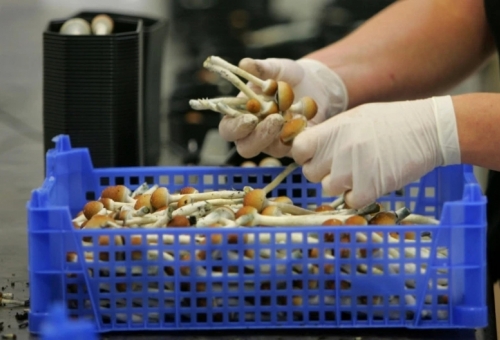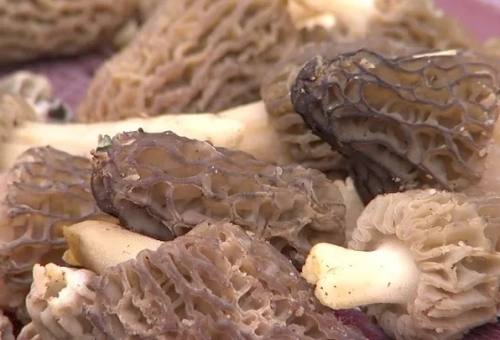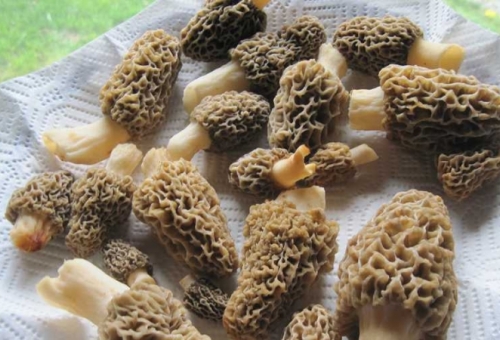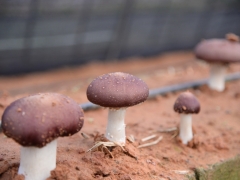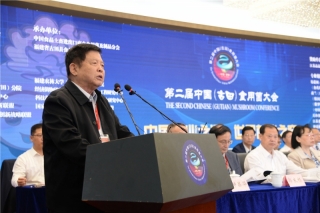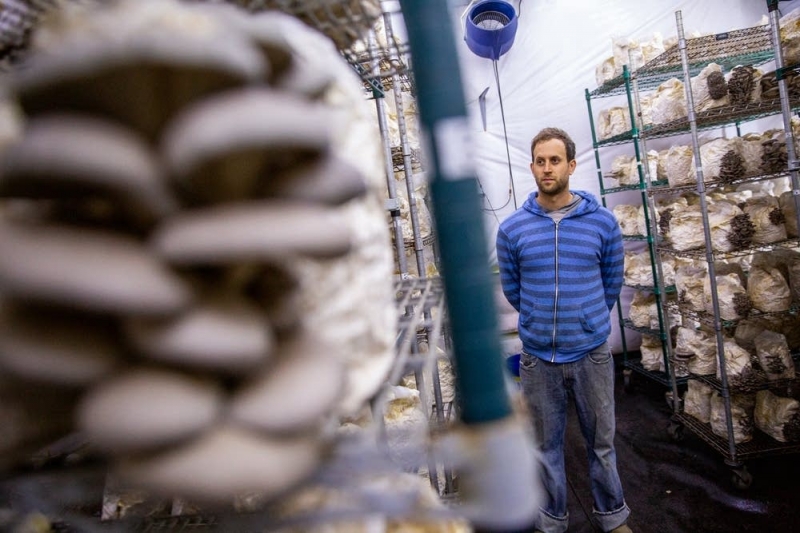
Fans of fresh mushrooms have been flocking to an unlikely spot in Minneapolis for their fungi fix in recent years, but a proposed redevelopment of the site has the farm's founder worried he may have to shut down.
Mississippi Mushrooms, which supplies top restaurants, is tucked away in an old warehouse at the Upper Harbor Terminal on the banks of the river in north Minneapolis.
Getting there is an adventure — a trip that takes visitors past the dilapidated buildings and dump trucks working the piles of construction gravel. They have to just trust the brightly colored arrow signs declaring "mushrooms" to find their way to Ian Silver-Ramp.
"I really like the kind of 'Mad Max' post-apocalyptic industrial feel," said Silver-Ramp, who founded the business about seven years ago. "I really like that aesthetic contrasted with rich vegetation and wildlife."
Look out the warehouse door and you see herons and eagles patrolling the Mississippi. Inside the warehouse, you find a custom-built mushroom mecca.
But Mississippi Mushrooms may well have to move, or as Silver Ramp fears, shut down.
The City of Minneapolis plans a $200 million redevelopment of the Upper Harbor Terminal. The proposal includes up to 5,000 housing units, office space, two parks and an outdoor performance space. The warehouse Mississippi Mushrooms calls home is slated for demolition.
Silver-Ramp started the business in his basement. As it grew he moved to a place in northeast Minneapolis. Then he found the Upper Harbor Terminal warehouse, which he says has everything he needed.
"We have the right kind of power here, we have high ceilings, we have floor drains, we have really strong concrete floors," he said. "Those are all really useful for what we do" — which is growing restaurant-quality mushrooms. It's mainly the large gray-blue oysters, but also giant trumpets, the smaller cedars and shitakes. Silver-Ramp said they produce 800 pounds a week, but he believes he can double that.
The mushrooms grow on what's called substrate, a mixture of sawdust, spent brewers grain and mustard seed chaff, fed into special bags about the size of a football.
The staff packs the specially designed bags onto pallets, which are then pushed into a giant pressure cooker for sterilization.
When that's complete, the pallets continue through a tunnel into an adjacent clean room.
"It cools off and then we inoculate it. We introduce the fungus to the sterilized media" said Silver-Ramp. "And then from there, you let the fungus start to colonize and grow."
That happens in a huge incubator nearby. Wrapped in blankets, it's the size of a small two-story house. Silver-Ramp said it heats itself.
"The fungus, just like an animal, is producing metabolic heat — body heat," he said. "So, it's about 75 degrees in there right now."
In the summer overheating is a real danger and the blankets come off. The packets spend from three to eight weeks in the incubator as the fungus colonizes the substrate.
"The big difference between a fungus and an animal is when an animal eats, it puts its food inside its body, and when a fungus eats, it puts its body inside its food," he said.
Then it's on to the growing rooms where soon the mushrooms sprout. Silver-Ramp can monitor individual pallets and control the temperature and humidity in each room using smartphone apps. The mushrooms are picked and most are shipped to restaurants. The public can also buy mushrooms at the warehouse from 11 a.m. to 2 p.m. on weekends. He hopes to open an artisan mini-market this summer on the loading dock outside the warehouse.
But this isn't the end of the process. When the mushrooms are done growing, the staff rip off the bags and begin composting the substrate. Silver-Ramp said in his opinion, it's the best compost you can get.
He wants to develop a process that doesn't require the bags. He said if they can do that, the business would not just be carbon-neutral — it would be carbon-negative
"This is why we need this site," he said "We need to be able to compost outdoors because we really are a biomass handling business."
Erik Hansen, director of economic policy and development for the city, said this was always going to be a temporary arrangement.
"The case that Mississippi Mushrooms made to the city was they understood it was during the interim while we are getting ready for the redevelopment," he said. "And all of their materials and fixtures are removable."
Hansen said there could be a space for the farm in the Hub, a sustainable business complex being built nearby as part of the project. Meanwhile, the Minneapolis City Council has requested a cost-benefit analysis on keeping the warehouse, which is now expected in June.





